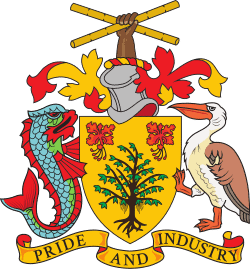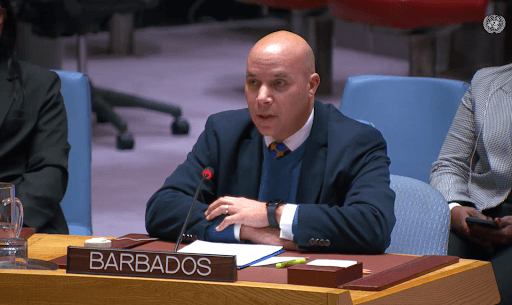Ambassador of Barbados to the United Nations, WTO and other International Organizations in Geneva, Matthew Wilson, speaking at a high-level event in Geneva, Switzerland, last Friday. (Ministry of Foreign Affairs and Foreign Trade)
Barbados took the lead in a discussion addressing plastic pollution last Friday in Geneva at a high-level event, during the Conferences of the Parties to the Basel, Rotterdam and Stockholm Conventions.
Given its leadership role at the WTO Dialogue on Plastic Pollution and Environmentally Sustainable Plastics Trade, Barbados partnered with Ecuador and the Forum on Trade, Environment and the SDGs, to focus on “Plastic Pollution and Transparency in Trade Flows in the Context Multilateral Environmental Agreements and the Protection of the Environment and Health”. Barbados was one of the six co-convenors, along with Australia, China, Ecuador, Fiji, and Morocco.
Ambassador of Barbados to the United Nations, WTO and other International Organizations in Geneva, Matthew Wilson, delivered the keynote address.
Acknowledging the importance of plastics in many areas, such as the medical industry, Ambassador Wilson stated that “today, we know the darker side of single-use plastics, including clogged waterways, strangled turtles, destroyed natural habitats, and more recently, the impact of micro-plastics on our health”.
He continued: “The trade dimension was not immediate a few years ago, but the dialogue on plastic pollution at WTO had done a commendable job in placing this issue on the global agenda.
“Trade in plastics was at a record $1.2 trillion in 2022, and if left unabated, this figure is set to triple by 2060, with the largest impact expected to be felt in developing countries.”
Mr. Wilson also highlighted that as a vulnerable economy and a small island developing state, Barbados feels the impact of this onslaught of plastic waste, which can take between 20 and 500 years to degrade in the environment.
During the meeting, it was stressed that plastic pollution continues to have a large impact on the blue economy, especially on coral reefs, fisheries, and tourism, as well as on human and animal health. On the issue of animal health, the Ambassador commended the work of the Barbados Sea Turtle Project and its efforts to recover marine turtle populations through the use of scientifically-sound conservation measures; monitor programmes; and educate the public about the danger of plastic waste in the ocean.
Referring to the trade dimension of plastic pollution, Mr. Wilson highlighted the role of plastic substitutes, such as seaweed, bamboo, and coconut waste products. However, he expressed concern that SIDS did not have a great share in the production of the alternatives.
“Although SIDS and coastal states have a large maritime footprint and these coastal ecosystems are viable, untapped solutions for exports of marine-based non-plastic substitutes and alternatives, the export share for these SIDS in these products was a mere 0.05 per cent,” he noted.
With regard to this country’s efforts to address plastic pollution and reduce its impact, Ambassador Wilson said the National Action Plan, which was launched in 2024 to end plastic pollution, aimed to reduce Barbados’ plastic pollution by 73 per cent over the next 10 years.
“It is ambitious, but we cannot solve the plastic pollution problem alone, as it is by its very nature, transboundary. We need to cooperate and coordinate efforts to address the plastic pollution crisis and its adverse effects on the environment and human health,” he stressed.
Author: Sheena Forde-Craigg
Source: https://gisbarbados.gov.bb/blog/barbados-leads-discussion-on-addressing-plastics-pollution/





